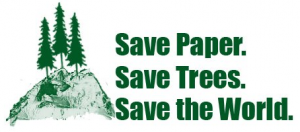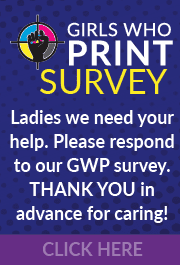
Doesn’t the print industry have better things to do than shake its fist at Google and their Go Paperless in 2013 campaign? So many already think Print is out of touch with the “new world,” so why add fuel to that fire? And the organizations that are speaking out, well they just have their own agenda’s to push. Google isn’t attacking anyone in the print, or paper industry, for that matter. This campaign is about office paperwork. It makes us seem like Luddites coming off so defensive!
Those are a few sentiments from “our side” being shared on social media, in various channels, from numerous discussions. And you know what, they are valid arguments. The problem is none of them address the core issue with Go Paperless in 2013. And until we all are clear on that, and unify to fix it, we are doomed to fight amongst ourselves about the tangents.
As Kermit says, “It’s not easy being Green.” But it’s apparently very simple to imply you are in marketing, especially when it comes to the phrase Go Green, Go Paperless.
Why does that matter? I will get to that in a second, first I would like you to consider this… The claim that is being made by Google for Go Paperless in 2013 is “save time, money and trees.”
To establish that an advertisement is false, a plaintiff must prove five things: (1) a false statement of fact has been made about the advertiser’s own or another person’s goods, services, or commercial activity; (2) the statement either deceives or has the potential to deceive a substantial portion of its targeted audience; (3) the deception is also likely to affect the purchasing decisions of its audience; (4) the advertising involves goods or services in interstate commerce; and (5) the deception has either resulted in or is likely to result in injury to the plaintiff.
 Deception is a strong word, and I don’t believe the “save trees” part was intended to deceive or trick consumers into purchasing digital and cloud services from Google and their partners. It is however a deceptive phrase. It does imply that consumers are doing something to save trees (aka beneficial to the planet) by using digital and cloud services instead of paper. Therefore, paper bad, digital good. That is the ONLY problem here. It’s simply not true.
Deception is a strong word, and I don’t believe the “save trees” part was intended to deceive or trick consumers into purchasing digital and cloud services from Google and their partners. It is however a deceptive phrase. It does imply that consumers are doing something to save trees (aka beneficial to the planet) by using digital and cloud services instead of paper. Therefore, paper bad, digital good. That is the ONLY problem here. It’s simply not true.
Two-Sides US, Choose Print, Print Grows Trees, Go Paper Grow Trees and a host of credible resources out there have pages of facts and stats you can refer to and look up which support the sustainability of paper, and the amount of trees has essentially remained the same for the past 100 years, way before digital anything came into the picture.
So why should this matter to you?
If it matters to you that automakers cant make up how many miles per gallon their cars get and slap it into ads, or that cosmetic companies can’t make claims and then use retouching to show results, or that airlines now have to include all of their “hidden” fees in pricing, this situation is no different, and there are laws against it.
Greenwashing isn’t good for anyone or any industry. To quote TwoSides US guest blogger Kathi Rowzie, “playing on consumers’ desire to be environmentally responsible without sound scientific backup only serves to further erode confidence in all green marketing claims, including the ones that represent real environmental value.”
 Greenwashing isn’t good for anyone in print and marketing. As I commented on PrintWeek’s site, “Until we change the misperception that “Paper Kills Trees,” we are holding the door open for “Print Kills Trees” instead of slamming it shut.”
Greenwashing isn’t good for anyone in print and marketing. As I commented on PrintWeek’s site, “Until we change the misperception that “Paper Kills Trees,” we are holding the door open for “Print Kills Trees” instead of slamming it shut.”
Perhaps you think that is a stretch? Well let me tell you about a horrific exchange I had with someone who works for a company that provides software solutions for print service providers to automate their workflow. I do not see an environmental claim on their site, but his position is that emailing PDF quotes, PDF invoices and linking to online PDF proofs, and I quote, “…reduce the amount of certain types of documents. In the three examples, it is also faster – and less energy consuming – than printing a quote or invoice, placing it into an envelope, placing postage on it, putting it in a mail box and have gas consuming trucks involved. Any rational person would agree that sending these documents as paper is wasteful, slower – so, less efficient and less ecological.”
And that is how it starts. Today it’s office copy paper; tomorrow it’s direct mail. And this is from someone IN our industry who is not (usually) irrational, but also has a bunch of mail automation software on their company product list!
It’s always someone else’s problem until it hits your doorstep, and usually by then it’s too late. Google did not attack us, but the idea they are spreading, unless it stopped, will eventually kill us. Then the trees might actually have something to worry about!
Join us on Twitter: Follow and use #paperless2013 in Tweets and RT’s
Join us on our Facebook Community Page: Say No To Paperless 2013










